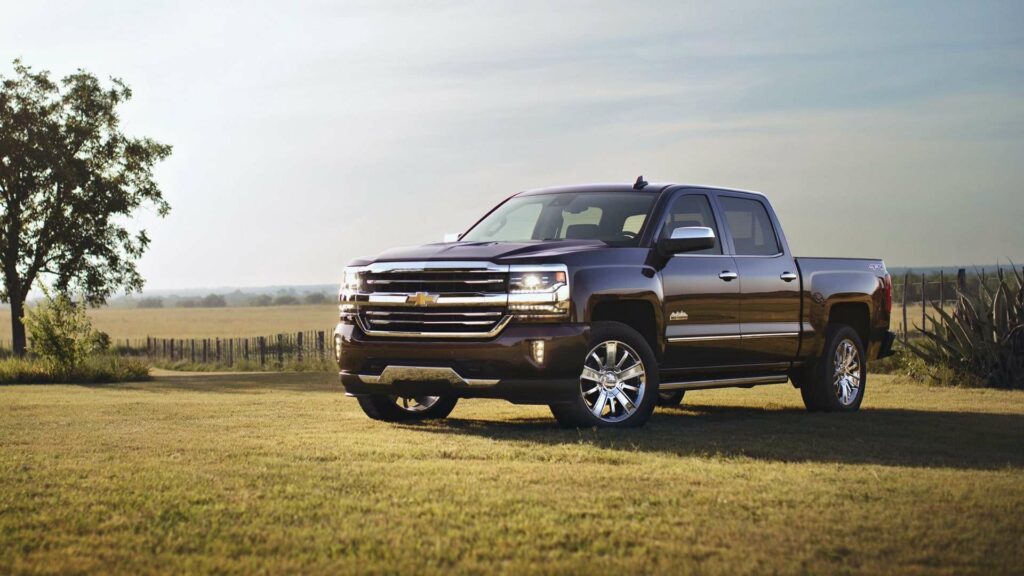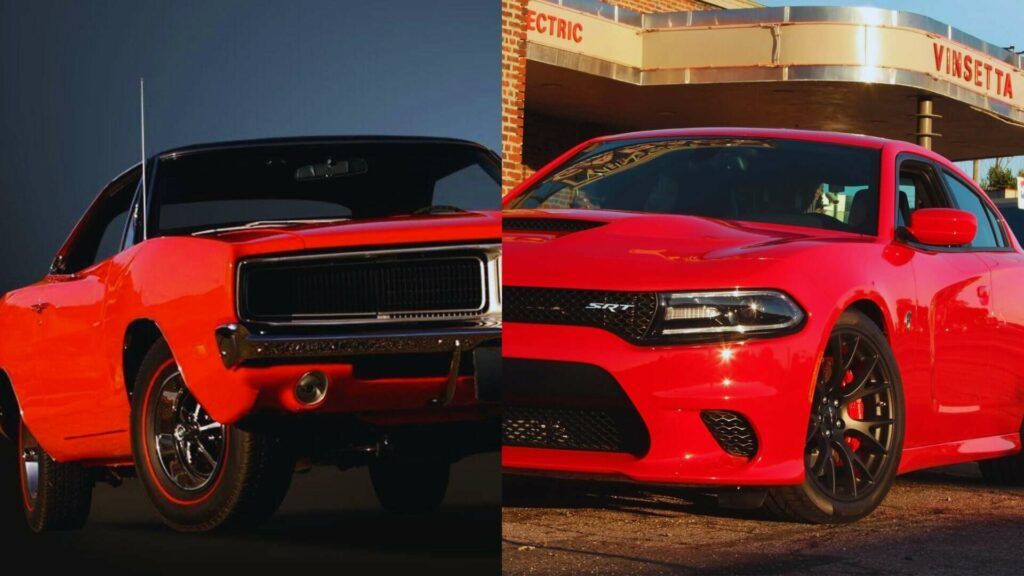We’ve done plenty of articles covering all sorts of aspects of the Chevy Silverado, and now we’ll be discussing the type of gas or fuel that it uses to power up its engine.
We’ve included tons of info on the types of gas that you should and shouldn’t use on the Chevy Silverado, as well as answers to frequently asked questions about its gas type, so be sure to stick around until the end!
What kind of gas does a Chevy Silverado take?
All gasoline-powered Chevy Silverados, excluding the 6.2-liter L87 V8 variants, need gasoline with a minimum octane rating of 87.
The 6.2-liter L87 V8 Chevy Silverado models require 93-octane premium gasoline.
All generations of the Chevy Silverado with a diesel engine simply need diesel fuel.
Throughout its production run, the Chevy Silverado has been equipped with multiple engines. But there are generally two octane ratings of fuel that you should keep in mind for its gasoline variants.

While the majority of the engines used in every Chevy Silverado generation can run on regular 87-octane gasoline, this is not the case for the newer 6.2-liter V8 engine introduced in 2019.
The 6.2-liter L87 EcoTec3 V8 that’s specifically used in the 4th-generation Chevy Silverado requires gasoline with a minimum octane rating of 93, which is already premium unleaded fuel.
Chevy Silverado diesel variants, such as those equipped with either the 3-liter Duramax turbodiesel I6 engine or the 6.6-liter Duramax turbodiesel V8 engine, simply require diesel fuel.

Fuel Requirements Based on Chevy Silverado Engine Type
Chevy Silverado models with the 6.2-liter L87 V8 engine require fuel with a minimum octane rating of 93, while all diesel variants should only use diesel fuel. All other engine types require only 87 octane fuel.
Chevrolet recommends using TOP TIER fuel for all of its Chevy Silverado engines.
The Chevy Silverado spans four different generations, and most of the engines used in these generations can run on regular 87-octane fuel.
However, there are two specific engine types that differ in fuel requirements from the rest, and that is the 6.2-liter V8 of the 4th generation and the diesel engines offered for each generation.
For your reference, we’ll be going into more detail about what kind of fuel these specific engines use below.
2019 to Present Chevy Silverado Fuel Requirement
2019 was the year that the 4th and latest generation of the Chevy Silverado entered the market, and all but one of its gasoline engines were compatible with 87-octane fuel. That sole engine is the 6.2-liter L87 V8.
Unlike its last-generation 6.2-liter counterparts, the newest L87 engine needs a higher minimum octane rating of 93 for its unleaded gasoline, which puts you in premium fuel territory (91 to 94 octane).

Following this fuel requirement satisfies the ASTM specification “D4814”, which basically sets the requirements needed to meet the fuel standards of automotive spark-ignition engines of today.
Moving on, there’s one more engine of this time period that obviously uses a different type of fuel, and that is the 3-liter Duramax turbodiesel engine.
The 3-liter diesel engine was first introduced for the 4th-generation Chevy Silverado in 2020 under the code “LM2”. This was later replaced by the “LZ0” for the 2023 model year.

While both of these engines obviously use diesel fuel instead of gasoline, Chevrolet specifically recommends using TOP TIER diesel fuel because of how well it can keep the engine clean and reduce deposits.
This is also true for the gasoline variants of the Chevy Silverado, in which the manufacturer recommends TOP TIER “Detergent Gasoline” that adheres to the same standards of engine cleanliness and performance as its diesel counterpart.

| Not a single Chevy Silverado model uses gasoline with an octane rating lower than 87, so using anything lower than that will cause the engine to knock and decrease fuel economy. |
Lower-octane fuel will burn prematurely compared to higher-octane ones, resulting in a rough combustion process and even damage to the engine internals if you put it in a vehicle that requires higher-octane fuel.
1999 to 2019 Chevy Silverado Fuel Requirement
Gasoline-powered Chevy Silverado models made between 1999 and 2019 all have the same fuel requirements regardless of their generation or the engine they’ve been fitted with.
The 1999 to 2019 model years are all part of the 1st to 3rd generations of the Chevy Silverado, and they all use regular unleaded gasoline with a minimum octane rating of 87.
But of course, as with the newer 4th-generation models we’ve discussed prior, Chevrolet also recommends using TOP TIER fuel for all gasoline-powered Silverado models from 1999 to 2019.
The only other Chevy Silverado engine with a different fuel requirement is the 6.6-liter Duramax turbodiesel V8 engine, and as its name suggests, it uses diesel fuel only.

While the 6.6-liter turbodiesel engine went through several iterations such as the LB7, LLY, and LBZ, the manufacturer still recommends using TOP TIER diesel fuel for all of them just like their newer 3-liter turbodiesel successor above.
Does a Chevy Silverado take regular gas?
Most Chevy Silverado models can take regular 87-octane gasoline. This excludes the ones equipped with the 6.2-liter L87 V8, which requires 93-octane gasoline, and all of the diesel variants that only use diesel fuel.
Types of Gasoline That Can Be Used in a Chevy Silverado
Gasoline variants of the Chevy Silverado can use either TOP TIER detergent gasoline or reformulated gasoline that has an octane rating of at least 87 (93 for the 6.2-liter L87 V8 engine).
TOP TIER Detergent Gasoline (Chevrolet’s Recommendation)
When it comes to choosing the best fuel to use for the Chevy Silverado, there is no better option than what the manufacturer recommends itself, which is TOP TIER detergent gasoline.
TOP TIER detergent gasoline contains carefully measured levels of detergent additives that serve to maintain a higher standard of engine cleanliness and performance.
It does so by preventing the buildup of deposits, debris, or “gunk” inside the engine, resulting in it running better and smoother.
Additionally, if you have the diesel variant of the Chevy Silverado, there’s also diesel fuel made according to TOP TIER specifications.
However, it can be trickier to find compared to its gasoline counterpart due to the number of brands that have it.
There are over 60 gasoline brands and two diesel brands with the TOP TIER specification across the US and Canada since April 2022, and you can spot them by looking for the logos below.

Reformulated Gasoline
Just in case you’re unable to find TOP TIER detergent gasoline in your area, you can also consider filling up your Chevy Silverado with reformulated gasoline.
Reformulated gasoline is another type of fuel that is more modern and designed to burn cleaner than conventional gasoline.
Using reformulated gasoline results in lower carbon emissions and less smog, making it one of the best choices of fuel for Chevy Silverado owners in areas with strict emission requirements.
While there’s no mention of specifically using reformulated gasoline in any manufacturer’s guide or manual for the Chevy Silverado, it still accounts for around 25% of all gasoline sold in the US, according to the United States Environmental Protection Agency.
This makes it still one of the most recognized and accepted forms of fuel out there for the majority of vehicles on the road.
Types of Gasoline/Fuel to Avoid for the Chevy Silverado
Avoid filling up your Chevy Silverado with any oxygenated blends, E-85 or any fuel with more than 15% ethanol, biodiesel, gasoline with MMT, and gasoline with added materials.
Oxygenated Blends or Flex-Fuel/E-85
Oxygenated gasoline blends contain up to 10% oxygenates such as ethanol. While the Chevy Silverado can take oxygenated blends to some degree, you should avoid putting in fuel that has more than 15% ethanol.
This means that blends with much higher ethanol content such as E-85 or “Flex-Fuel” should be avoided unless your Chevy Silverado has been equipped with a flex-fuel system.
A quick way to find out if your Chevy Silverado, or any vehicle for that matter, is flex-fuel-capable, you can check if it has a yellow fuel cap or sticker on the fuel door. If it does not have this, then don’t put in gasoline with more than 15% ethanol.

| According to GMAuthority.com, the 2021 Chevrolet Silverado HD, specifically, is flex-fuel-capable, but only if you opt for the regular cab body configuration and the “Work Truck” trim. |
Biodiesel
As with other pickup trucks, the Chevy Silverado comes with diesel engine options as well. However, this does not mean that you should be using biodiesel for them.

Just like gasoline with ethanol, diesel can also come with its own blend of biodiesel, which is a cleaner alternative to conventional diesel that’s derived from vegetable oil, animal fat, and waste cooking oil.
But unfortunately, Chevrolet advises Chevy Silverado owners to not use diesel blends with more than 20% biodiesel content, as this can lead to a decrease in engine performance and even damage in the long run.
| If you were to use a biodiesel blend, Chevrolet recommends using a blend of only 5% biodiesel, especially if you do not use your vehicle often. |
Gasoline with MMT (Methylcyclopentadienyl Manganese Tricarbonyl)
MMT is a metal additive typically used in leaded gasoline in the US (and even unleaded gasoline in Canada) that serves to reduce engine knocking by boosting the octane rating of the fuel.

The main downsides to this additive are that it’s more toxic to the environment through the vehicle’s emissions, and it can cause damage to the vehicle’s spark plugs and emission system.
Nowadays, the majority of gasoline brands choose to be completely MMT-free because of the numerous downsides of metal additives like MMT, and it makes sense that Chevrolet wouldn’t recommend using it either when filling up your Chevy Silverado.
Gasoline with Added Materials (Methanol, Methylal, Ferrocene, Aniline)
Different types of gasoline can have different additives such as methanol, methylal, ferrocene, and aniline, all of which are not recommended for use on the Chevy Silverado.
While there are so many different fuel additives that are used to provide benefits such as a higher octane rating or a cleaner engine, the four mentioned above can corrode the engine internals of the Chevy Silverado.
If you were to use fuel with an additive, then the best choice would be TOP TIER detergent gasoline or diesel.
Alternatively, you can also use ACDelco Fuel System Plus-Gasoline/Diesel, which is a type of additive that you pour inside the gas tank yourself before filling up with more fuel.

Gasoline Less than 87 Octane
Since the majority of Chevy Silverado models can take in a minimum of 87-octane gasoline, save for the 6.2-liter L87 models with their 93-octane requirement, going lower than this octane rating should be avoided at all costs.
If you go lower than the recommended gasoline octane rating of your vehicle, you run the risk of engine knocking and decreased performance because the fuel would ignite earlier than it should.
What will happen if I use the wrong gas type?
Putting in the wrong type of gas in your car can decrease engine performance and cause engine knocking, which can damage the internals.
This can happen when you use fuel that has a lower octane rating than what your vehicle is designed for.
Frequently Asked Questions (FAQs)
What’s the gas tank capacity of a Chevy Silverado?
The Chevy Silverado has a gas tank capacity of 28.3 gallons (107 liters) for the Regular Cab option, and 24 gallons (91 liters) for both the Double Cab and Crew Cab options.
What if I hear a knocking sound from the engine after refueling?
If you hear a knocking sound from the engine after refueling, you may have put in the wrong type of fuel, or the fuel is contaminated.
However, engine knocking can also be caused by other issues such as incorrect air-fuel ratio and incorrect ignition timing.
Does the Chevy Silverado get good gas mileage?
The Chevy Silverado’s gas mileage varies from as low as 13 mpg to as much as 33 mpg depending on the engine option, drivetrain option, and whether or not it has an extra fuel management feature.
| Chevy Silverado Engine | Drivetrain | Lowest Combined MPG | Highest Combined MPG |
| 2.7L Turbocharged I4 | 2WD | 20 | 23 |
| 4WD | 19 | 22 | |
| 3.0L Duramax Turbodiesel I6 | 2WD | 23 | 33 |
| 4WD | 22 | 26 | |
| 4.3L EcoTec3 V6 | 2WD | 16 | 21 |
| 4WD | 15 | 20 | |
| 4WD Trail Boss | 14 | 18 | |
| 5.3L EcoTec3 V8 (6-Speed) | 2WD | 14 | 21 |
| 4WD | 14 | 20 | |
| 4WD Trail Boss | 13 | 18 | |
| 5.3L EcoTec3 V8 (Active Fuel Management included) (6-Speed) | 2WD | 15 | 21 |
| 4WD | 15 | 20 | |
| 4WD Trail Boss | 14 | 18 | |
| 5.3L EcoTec3 V8 (Dynamic Fuel Management included) (8-Speed) | 2WD | 17 | 23 |
| 4WD | 16 | 22 | |
| 5.3L EcoTec3 V8 (Dynamic Fuel Management included) (10-Speed) | 2WD | 15 | 21 |
| 4WD | 15 | 21 | |
| 6.2L EcoTec3 V8 | 2WD | 23 | 33 |
| 4WD | 22 | 26 |
How much does it cost to fill up a Chevy Silverado?
Filling up gasoline variants of the Chevy Silverado will cost an average of $100 for the Regular Cab and $85 for both the Double Cab and Crew Cab.
Filling up diesel variants of the Chevy Silverado will cost an average of $92 for the Regular Cab and $80 for both the Double Cab and Crew Cab.




